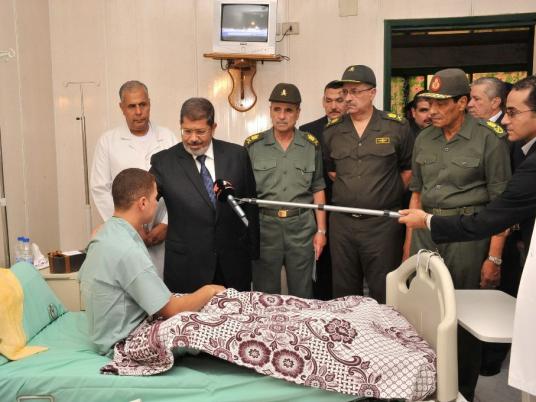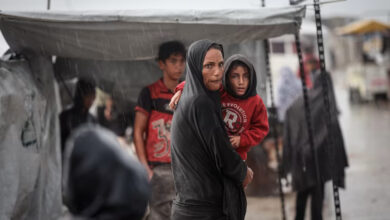
After last month's attacks in Sinai that killed 16 Egyptian security officers, questions have loomed over President Mohamed Morsy’s ability to control militancy in the peninsula, which is often held to be connected to the infiltration of radical fighters from the neighboring Gaza Strip.
Controversy has therefore raged over the recent rapprochement between the Hamas-led strip and the Brotherhood-led Egypt.
Hamas co-founder Mahmoud al-Zahar, who also serves as the foreign minister for the Hamas-led government in Gaza under Prime Minister Ismail Haniyeh, told Egypt Independent from Gaza that “up until now, there is absolutely no proof that anyone from Gaza was part of this attack.”
"The old media in Egypt affiliated to the old regime attacked Gaza for this incident and took people down a wrong path, and tried to drive a wedge between Egypt and Gaza, and brought up the issue of power cuts in Egypt as if Gaza is responsible,” he says. “We contacted them to respond but the tide of opinion had become too high.”
Media reports did refer to suspects who entered Sinai from the Gaza Strip, often by radical groups opposing the rule of Hamas. The issue has raised questions over Hamas’ ability to control the strip against its own opposition. Statements from the Gaza government purported its full readiness to cooperate with Egypt on the Sinai question.
But even with the current crisis and the allegations that Hamas is part of it, the group remains positive about Cairo’s new friendly administration.
Morsy’s recent decisions regarding the military reshuffles were positively met by the Gaza administration, which was long antagonized by the rule of Hosni Mubarak and its affiliated institutions, including the military.
Under the Mubarak regime, relations had been strained with Gaza’s de facto rulers, which led to a five-year-long blockade on the territory. The one crossing Egypt shared with it, Rafah, was only intermittently opened to allow passage for Palestinians. There is a desire from Gaza for this to change.
“It is a purely internal Egyptian decision and is not for us to comment on it. However, we see that the Egyptian street supports such a move, and we see that the power of a regime stems from the power of the people who support it. We hope Egypt gets through this transitional period as soon as possible and reclaims its pivotal regional role,” Zahar says.
But it’s not just about Hamas, he says.
"Let us talk about the importance of a Morsy victory for Palestine as a whole, not just Gaza and Hamas. Gaza is only two percent of Palestinian land and Hamas does not represent all Palestinians,” Zahar told Egypt Independent previously.
Ibrahim al-Madhoun, a Gaza-based policy researcher with ties to the Hamas government and head of the Future Research Center, discussed the future of Egypt-Gaza relations after Morsy’s presidential victory with Egypt Independent.
“Egypt is vital to any Gaza government, whether Hamas or otherwise. Egypt is Gaza’s oxygen for the challenge to the Zionist occupation. Any positive change in Egypt, wherein someone assumes power with a popular mandate, makes a huge difference. It serves the resistance in Gaza and helps Hamas. Egyptians as a people support the Palestinian cause and will offer help,” he says.
He also addressed the Mubarak regime’s effect on relations.
“We knew the previous regime harmed the Egyptian people and harmed the people of Gaza. They helped in the siege for so long and there was a complicit acceptance of the aggression of 2008.”
At the heart of the relationship between Egypt and Gaza is the Rafah border crossing, the only conduit to the strip not directly controlled by Israel. Under a US-brokered treaty, the crossing was manned by European Union observers up until the Hamas-Fatah schism of 2007, during which one faction took Gaza while the other took the West Bank.
Eighteen months later, in December 2008, Israel launched an assault on the Gaza Strip. The three-week blitz, dubbed Operation Cast Lead, caused the death of almost 1,400 people, half of whom were civilians, including a large proportion of women and children (estimated at 600).
Since then, the Rafah crossing has opened sporadically to allow some movement, but often Palestinians are stranded on either side of the border for days trying to get in or out. This caused a crisis with the government in Cairo, which many felt was helping impose the siege of the strip.
As a result, underground tunnels sprung up along the border, moving all manner of goods and fuel, including cars and goats. There were also reportedly tunnels that were used to transport weapons to Hamas.
Zahar says he hopes the crossing becomes an international border, with free movement of goods as well as people. This way, the tunnel activity would cease, he says. Egypt is currently promoting its bid to destroy the tunnels from its side, a mission not easily achievable due to its so-far lack of military success in Sinai.
“If there is an open market on the border, there will not be a need for tunnels and smuggling. If we have this open market with Egypt, the tunnels will be rendered useless,” says Madhoun.
With Morsy’s election, the neighbors to the east in the Gaza Strip seem cautiously optimistic that change will come to the troubled interactions between the two.
Whether there is an upturn in relations might have to do with the traditional affiliations between the Brotherhood and Hamas, which is an offshoot of the Egyptian group. However, observers in Gaza are well aware that Egypt faces numerous other issues and the Palestinian issue will have to come second to pressing domestic affairs.
Madhoun says there is no denying the good relationship between Hamas and the Brotherhood, but the question is whether that will translate into more official cooperation.
“We understand that their priority is Egypt and local issues before moving on to more regional issues. There is a conviction here that a strong Egypt is needed to help Palestine,” he says.
This piece was originally published in Egypt Independent's weekly print edition.




